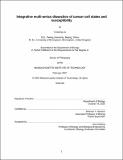Integrative multi-omics dissection of cancer cell states and susceptibility
Author(s)
Liu, Yunpeng(Biologist)Massachusetts Institute of Technology.
Download1252627450-MIT.pdf (35.02Mb)
Other Contributors
Massachusetts Institute of Technology. Department of Biology.
Advisor
Michael T. Hemann.
Terms of use
Metadata
Show full item recordAbstract
Cancer cells are characterized by a broad spectrum of unique genetic, epigenetic and transcriptional states, which are often concomitant with high degrees of plasticity in cell identity. These cell states and the fluidity therein are a major source of resistance to both chemotherapy and targeted therapy. Combinatorial efforts in experimental assays and computational modeling are pivotal for understanding the origins of cancer cell plasticity and exposing cell state-specific vulnerabilities. In this thesis, I will first present my studies on two clinically challenging types of hematopoietic malignancies and discuss key genes that sustain cell identity and survival programs revealed through multi-omics approaches. In the first study, a combination expression, chromatin binding and chromatin accessibility analyses revealed the plant homeodomain finger-like family protein PHF6's novel functions as a lineage identity regulator in a mouse model of BCR-ABL-driven B cell acute lymphoblastic leukemia. In the second case, single cell transcriptomic profiling, computational inference of cell cycle trajectories and unbiased functional genomics jointly identified RAD51B as a uniquely essential gene in near-haploid leukemia. Finally, to systematically model heterogeneous cell states and generate readily testable predictions of susceptibilities in cancer, I proposed a novel computational pipeline that integrates multiple data types to construct a quantitative model of transcription regulation, which can in turn be used to infer changes in gene expression in response to transcription factor perturbation. The pipeline then uses these gene expression responses to perturbations to estimate changes in protein activity and finds a combination of protein activity score changes that best predicts changes cell fitness. Applying the pipeline to glioblastoma multiforme - a cancer type that lacks effective targeted therapy, I prioritized a small set of genes including MYBL2 as subtype-specific candidate targets. My thesis work demonstrates the power of integrative, multi-omics approaches for effective discovery of susceptibilities in cancer and highlights an emerging paradigm for understanding the information flow in the cellular circuitry.
Description
Thesis: Ph. D., Massachusetts Institute of Technology, Department of Biology, February, 2021 Cataloged from the official PDF of thesis. "February 2021." Includes bibliographical references (pages 217-239).
Date issued
2021Department
Massachusetts Institute of Technology. Department of BiologyPublisher
Massachusetts Institute of Technology
Keywords
Biology.